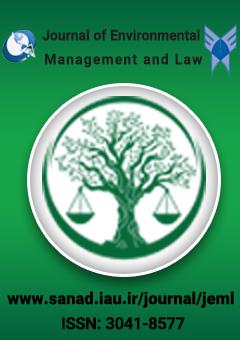The culture of environmental conservation from the perspective of Islam
Subject Areas : Islamic environmental law
1 - Department of Environmental Sciences, Waste and Wastewater Research Center, Isfahan (Khorasgan) Branch, Islamic Azad University, Isfahan, Iran.
Keywords: Environment, Environmental Pollution, Islam & Holy Quran.,
Abstract :
Natural resources and a healthy environment are among the most important issues in Islam and among the most essential human needs. From the point of view of Islam, polluting the environment and nature, which is a platform for the exaltation of the human soul as God's successor, is forbidden and considered one of the major sins, and it causes people to be far from God's mercy and forgiveness because of this disbelief. This issue is clearly stated in the Holy Qur'an and can be seen in the hadiths and the lives of the Imams (PBUH). In this research, an attempt has been made to give a brief overview of some of these verses and narrations in a classified manner and in the fields of water, soil, air, trees, etc. In order to clarify the views of Islam about the environment, it is divided into three separate categories, including the environment, the basis for human growth and excellence, environmental culture derived from the position of the divine caliphate of man, environmental conservation in Islam and in the lives of the Imams (PBUH). According to the investigated cases, correct and coherent planning in the direction of reviving the authentic Iranian-Islamic culture and developing religious rules and teachings about the real importance of nature, understanding God's original ownership of all natural resources, creating a spirit of saving, especially in the case of natural and national resources is a solution that can lead our society towards reasonable utilization of natural resources.
Almasondi, A., Moradkhani, A., & Abedian, S. H. (2023). Environment and the need to preserve it from the perspective of Quran and Nahjul-Balagha, Quarterly Journal of Nahj al-Balagha Research, 11(41), 121-144. [In Persian]
Al-Muttaqi al-Hindi. (1998). Kanz al-‘ummal fi sunan al-aqwal wa-l-af‘al, ed. Mahmud ‘U. al-Dumyati, Beirut, Dar al-Kutub al-‘Ilmiyya.
Balkhi, A. Z. (2009). Masalih al-Abdan wa al-Anfuse. 1st Edition. Tehran: Research Institute for Islamic & Complementary Medicine of Iran University of Medical Science.
Cardozo, B. L., Bilukha, O. O., Crawford, C. A. G., Shaikh, I., Wolfe, M. I., Gerber, M. L., & Anderson, M. (2004). Mental health, social functioning, and disability in postwar Afghanistan. Jama, 292(5), 575-584.
Damad, S. M. M. (2000). A Discourse on Nature and Environment from an Islamic Perspective. Department of the Environment. [In Persian]
Esmaeili, A., Rezaeian, M., Vaziri Nejad, R., Tabatabaei, S, Salem, Z., Mahdian, F.,(2007). Environmental Protection in Islam, Journal of Rafsanjan University of Medical Sciences, Health Special Conference on the teachings of the Prophet (PBUH), Volume VI, Winter 1386, 55-60. [In Persian]
Harrani, A. M., & ibn Ali, H. (1974). Tuhaf al-'uqul Anal Al-Rasul. Qom: Dar al-Kotob al-Islamiyah.
Hor Ameli, M. (1988). Tafsir Wasa'il al-Shia ila Tahsil Masa'il al-Shaiyah. (1st ed.). Qom: Alulbait Institute.
Ibn-Babuya, M. I., al-Ahundi, A., & al-Harsan, H. A. M. (1971). Man la yahdaruhu'l-faqih. Dar al-Kutub al-Islamiya.
Koleini, J. (1983). Furu Al- Kafi (1). Tehran: Dar al-Ketab al- islami.
Koleini, M. (1986). Usul al-Kafi. Tehran: Islamiyah, 210-211.
Majlesi, M. B. (2013). Bihar al-Anwar. Tehran: al-Maktabah al-Islamiyah.
Majlisi, M. B. (1682). Tauhid-e Mufaddal. Trans. Allama Majlisi, 1. [In Persian]
Makarem Shirazi, N. (1999). Tafseer-e-Namoona. Tehran: Dar-Al-kotob Al-Eslamieh, 27, 139. [In Persian]
Makarem Shirazi, N. (2003). Ketab al-Nekah (Marriage Book). [In Persian]


